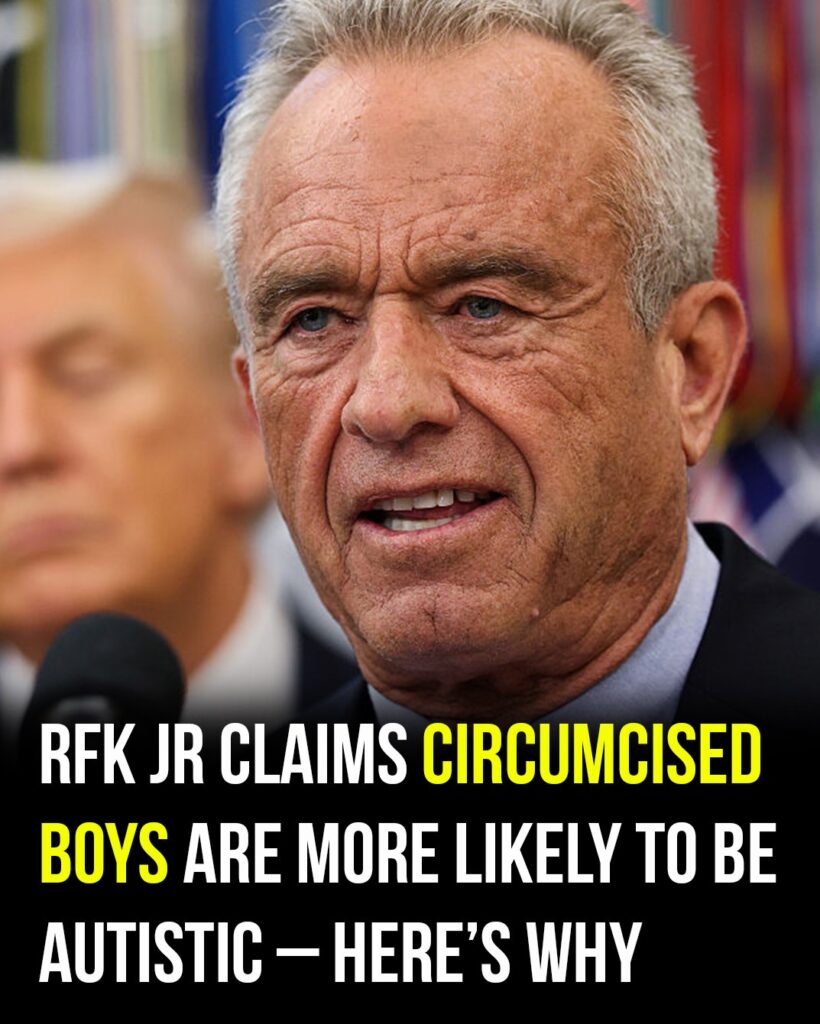Robert F. Kennedy Jr., the sitting U.S. Health Secretary, has once again ignited controversy with a string of scientifically disputed statements linking common medical practices to autism. In a recent closed-door Cabinet meeting attended by former President Donald Trump, Kennedy revived one of his most criticized theories—claiming that the use of the over-the-counter painkiller Tylenol during pregnancy could increase the likelihood of autism in children.

Kennedy reportedly told attendees that “anyone taking that stuff during pregnancy unless absolutely necessary is irresponsible,” while admitting there was no definitive proof. He asserted that his team was “doing the studies to make the proof,” suggesting future research would vindicate his claims.
This isn’t the first time Kennedy has targeted mainstream medicine. Over the past few years, he’s made repeated attempts to link widely used medications and medical procedures to autism—a developmental condition with no known singular cause and a strong genetic component, according to scientific consensus.
Just weeks before this latest meeting, Kennedy and Trump hinted at a “potential breakthrough” supposedly connecting acetaminophen (the active ingredient in Tylenol) with higher autism risk in children born to mothers who used it during pregnancy. Their comments were swiftly met with backlash. The Centers for Disease Control and Prevention (CDC), the World Health Organization (WHO), and the American Academy of Pediatrics all reaffirmed that no scientific evidence supports such a link.
Tylenol’s manufacturer publicly condemned the claim, calling it “irresponsible fearmongering.” Autism advocacy groups, including the National Autistic Society, criticized the rhetoric as “anti-science and harmful,” warning that it spreads misinformation and fosters guilt among parents.
Still, Kennedy doubled down—adding another layer to his theory that drew particular outrage. He claimed infant circumcision could contribute to autism, alleging the procedure leads to Tylenol exposure for pain management, which in turn “doubles the risk.” His comments referenced a 2015 Danish study, but experts quickly clarified that the research found a weak correlation between circumcision and autism diagnoses, not causation—and notably contained no data on Tylenol or any other medications.
Kennedy’s remarks also included a bizarre misstep that sparked ridicule online. While referencing a social media clip, he claimed a woman was “gobbling Tylenol with a baby in her placenta”—a biological impossibility, as babies develop in the uterus, not the placenta. Critics said the blunder highlighted his shaky grasp of basic anatomy and scientific terminology.
Health experts are increasingly alarmed that Kennedy’s platform as Health Secretary gives these fringe ideas undue legitimacy. “When misinformation comes from a high office, it’s not just embarrassing—it’s dangerous,” said Dr. Marcia Lopez, an epidemiologist at Johns Hopkins University. “Parents could hesitate to take safe medications or follow medical advice because they’re scared by baseless claims.”
Others warn the administration’s willingness to entertain such statements could undermine public trust in science and healthcare. Former President Barack Obama, speaking at a recent public health forum, cautioned against allowing conspiracy theories to “shape medical policy.” “Leadership requires truth,” he said, “especially when lives depend on it.”
Supporters of Kennedy argue that he’s simply asking questions that mainstream medicine refuses to explore. His spokesperson released a statement saying, “Secretary Kennedy believes all potential causes of autism deserve investigation, especially those tied to chemical exposure.” Critics, however, view this as a dangerous misuse of authority that conflates speculation with evidence.
The autism community has been particularly vocal in its frustration. Many parents of autistic children see Kennedy’s claims as not only false but deeply stigmatizing. “We’ve spent decades trying to remove the shame and pseudoscience surrounding autism,” said Jennifer Mackey, mother of a 12-year-old autistic son. “Every time someone in power pushes another baseless theory, it sets us back.”
Scientists say autism is influenced by a combination of genetic and early developmental factors—not vaccines, medications, or circumcision. Major studies involving millions of participants across multiple countries have consistently found no link between Tylenol or similar drugs and autism.
Despite overwhelming opposition, Kennedy remains steadfast. “I’m not backing down because it makes people uncomfortable,” he told reporters last week. “We owe families answers.”
But many in the medical community say what families truly need is reassurance based on facts, not fear. “Public figures must understand their words carry weight,” said Dr. Lopez. “Questioning science is healthy. Inventing it is not.”
The debate now raises a broader question: how far should freedom of speech extend when misinformation risks public harm? Should a sitting official face consequences for promoting unproven medical claims, or does suppressing such speech risk political overreach?
Whatever side of that question one lands on, the situation underscores a growing tension in modern society—between the right to speak freely and the responsibility to speak truthfully.
Kennedy’s latest remarks have made one thing clear: the war over science, politics, and public trust is far from over.



